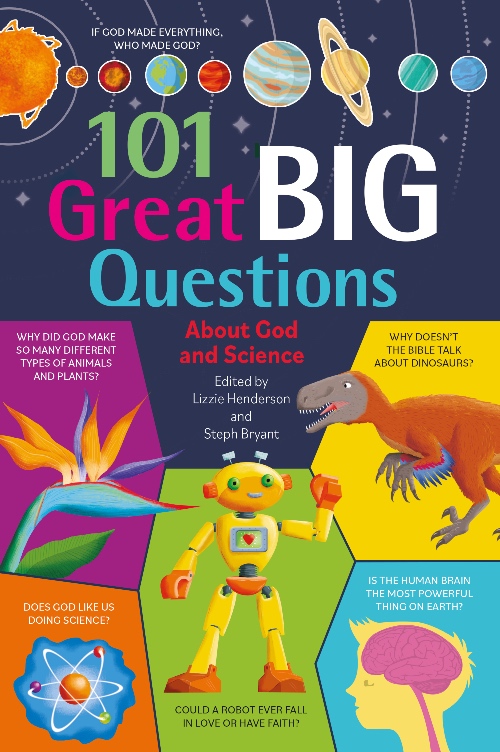Five tips for exploring our children’s biggest questions about God and science
By Steph Bryant, co-author of 101 Great Big Questions about God and Science

Many young people are under the impression that science and faith are incompatible ways of exploring the world, between which they must choose. This British Science Week, I thought I’d share some of the things I’ve personally found to be the most helpful things to remember when it comes to changing this narrative to help our young people celebrate both science and faith.
1 Start by Enjoying Science
It might sound like a bit of a cop out, but don’t underestimate the power of creating a space for young people to simply enjoy the wonder of science. If you’re a person of faith, or in a religious setting, this small step communicates something that surprises many young people: it’s possible and even normal for people who love God and his word to also love and enjoy science.
If that’s all you do, you’ve already done something great! Next time a young person hears a flippant ‘all Christians are against science’ or ‘you can’t be a real Christian if you love science’, the fun science activities they did with their Christian Grandma, or the engaging science experience they had at a church youth group that time, may well give them pause.
What could this look like?
There are loads of simple, low cost, science activities and experiments to suit a whole range of contexts. From getting out in nature with a magnifying glass, to making a kitchen volcano with vinegar and baking soda, there is so much fun to be had – so start exploring!
2 Celebrate Science as a gift from God
Lots of young people are under the impression that science is replacing God as the best way to explore all our questions, with each new scientific discovery casting a threatening shadow.
But many Christians, throughout history and today, view science as an incredible tool for learning more about our universe; the wonderful processes by which God has created and continues to create; and how to take better care of people and planet earth, as God’s stewards. With this view of the relationship between science and faith, instead of God shrinking with each new discovery, our view of Him can grow ever bigger and more awesome.
What could this look like?
Off the back of an exciting science experiment or awe-inspiring activity with your young people, could you consider offering a prayer of thanksgiving and praise to the God behind it all? If you need some inspiration, the Psalms are packed full of wonder at God’s world. Psalm 8 is one of my favourites - considering God’s works and crying out in praise!
You could also help your young people think about how science is a gift that can help us to align better with God’s plan for His world. For example, science can inform our efforts to take really good care of the planet. What practical lifestyle changes or projects could you explore? Making an insect house for the garden, planting some bee friendly seeds, cooking a meat free meal together, or making the switch to use LED bulbs in your lights are just a few ideas you could try – just make sure you remember to highlight and celebrate how science has helped us take better care of God’s world!
3 Validate all questions
Once you create a space where young people feel safe to voice their questions, the questions will certainly come! To help with this I make a point of thoughtfully exploring all questions, even the ones I might deem to be ‘cheeky’, ‘inappropriate’, or ‘silly’. I find that young people respond well to this willingness to meet them where they’re at, join in with their silliness, and then take it somewhere interesting. Soon, they start to engage and trust you with their bigger, often more vulnerable questions too.
What could this look like?
Instead of ‘Hush, I’m busy!’ or ‘Are there any sensible questions?’ could you try ‘What a great question, I’m a bit busy right now, but I’m going to write it down, and get back to you!’ or ‘Wow, the chicken or the egg! It’s funny isn’t it? But actually, it’s a really interesting question that people have been arguing about for a very long time – here’s what I think…’
4 Embrace the ‘I don’t know’
Don’t panic if a question comes up that leaves you feeling stumped or under pressure. Remember, this really isn’t about having the right, best or most impressive sounding answer. What young people are really looking for is someone who can model an honest and open-minded way of digging deeper into doubts, uncertainties, and big questions. This includes helping them to identify the different human ways of exploring that can helpfully contribute to their questions.
For example, science is really great at exploring the physical, natural world, how things work or the processes behind the things we see around the world; whereas faith and reading the Bible can help us to think about questions about who God is, and our place and purpose on planet earth.
For lots of our questions, like ‘What makes me, me?’, lots of different ways of exploring including science and faith can add together to help us understand even more than if we only thought about one way of exploring.
What could this look like?
If you’re on the spot, admit that you’re not sure, and identify why you’re not sure. Is it because you haven’t googled it yet? Is it because no-one has found an answer yet? Why not? Do we need a more powerful telescope? Or more time to collect observations?
Then offer some of your initial thoughts on the topic. If you have time, ask if the young person minds if you do a little bit of reading and get back to them. If you do this, make sure you fill them in on your thought process, and where you went to find out some ideas, so that they can learn from you about the process of tackling big questions.
5 Remember you’re not alone
 There are a whole wealth of resources about science and faith. The really great news is that in the last few years lots of people have taken some of the big, challenging questions about God and science, and developed some great books and resources that explore these ideas in exciting, engaging and helpful ways for young people.
There are a whole wealth of resources about science and faith. The really great news is that in the last few years lots of people have taken some of the big, challenging questions about God and science, and developed some great books and resources that explore these ideas in exciting, engaging and helpful ways for young people.
These resources could be a great starting point for exploring many of these big topics and questions confidently with your young people. Check out here, here and here for some inspiration.
Feeling overwhelmed? That’s ok, go back to tip #1 – and enjoy!
Image | MART PRODUCTION | Pexels
Steph Bryant is the co-author of 101 Great Big Questions about God and Science, alongside Lizzie Henderson. The book is published by SPCK/Lion Hudson in association with the Faraday Institute.
Steph and Lizzie coordinate the three main strands of the Faraday Institute's Youth and Schools Programme: workshops for children and young people; training for teachers and influencers; and book and resource production (each supported by and feeding into educational research).
Do you have a view? Share your thoughts via our letters' page.
Baptist Times, 15/03/2022